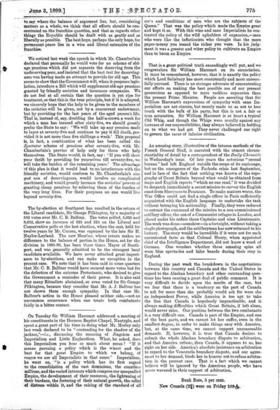We noticed last week the speech in which Mr. Chamberlain
declared that personally he would vote for no scheme of old- age pensions which did not separate the deserving from the undeserving poor, and insisted that the best test for deserving- ness was having made an attempt to provide for old age. This seems to show that the Government will, when it proposes legis- lation, introduce a Bill which will supplement old-age pensions granted by friendly societies and insurance companies. We do not feel at all certain that the question is yet ripe for treatment, or that this is the true principle, but if it is adopted, we sincerely hope that the help to be given to the members of the societies will be given, not by a concurrent endowment, but by providing for the last years of the aged person's life. Thai is, instead of, say, doubling the half-a-crown a week for which a man has insured after sixty-five, we should greatly prefer the State to say: We will take up any pension made to lapse at seventy-five and continue to pay it till death, pro- vided it is not more than five shillings a week.' This proposal is, in fact, a combination of what has been called the Spectator scheme of pensions after seventy-five, with Mr. Chamberlain's proviso of help only for those who help themselves. The State would, in fact, say : If you will show your thrift by providing for yourselves till seventy-five, we will take the burden of the remaining years.' . The advantage of this plan is that it would lead to no interference with the friendly societies, would conform to Mr. Chamberlain's sine gad non of deservingness, would involve no complicated machinery, and would greatly increase the societies' powers of granting cheap pensions by relieving them of the burden of the very long lives. For their purposes no one would live beyond seventy-five.






































 Previous page
Previous page